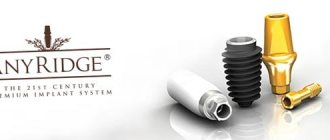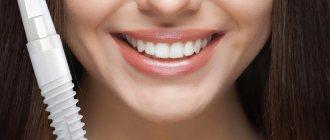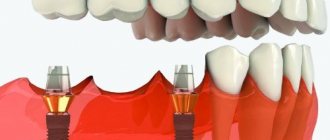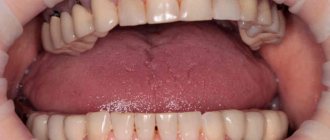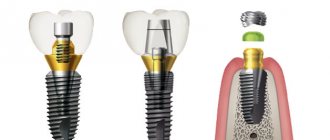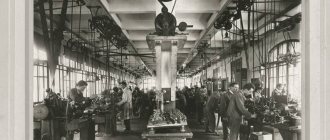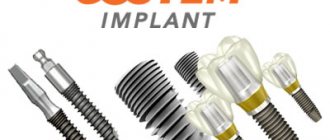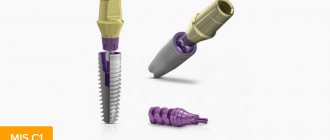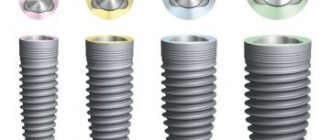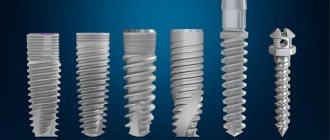Advantages Features of coverage Model range Stages of treatment Contraindications Disadvantages Prices How to choose a clinic?
In 1997, the first Osstem implants were released in South Korea. 20 years have passed and Osstem implants has become the largest manufacturer of dental materials in Asia and took 5th place in the global implant market. The quality of the products of this brand is not inferior to the best European implants, and their prices belong to the business segment. In Korea, the Osstem implant is the most popular brand.
The demand for implants is growing in all countries. This is due to rising incomes, an aging population, and growing interest in health. More and more people want to improve their quality of life. Implantation may be the answer to these requests.
Osstem implants have received certificates from South Korea, the USA, and Europe, recognizing them as a world-class product.
The Osstem representative office in Russia opened in 2006. Since then, thousands of people have had the chance to experience the quality of these implant systems in practice.
History of the development of Osstem from South Korea
In the 90s, South Korea experienced rapid economic and industrial growth, most of all this affected the sphere of high technology and medicine. Today, South Korean companies are among the leading suppliers of equipment and technological solutions for dentistry in general and implantology in particular. As for the Osstem Implant System company itself, it is one of the largest players not only in the Asian but also in the world market.
The company was founded in 1992 and is considered one of the pioneers in the development and production of dental implants in Korea. However, the year of foundation does not mean that the first implant was released in 1992. The industrial license was received only in 1995, and commercial production of Osstem Implant System products started in 1997. The long journey of development and testing paid off: by the mid-2000s, the company had released two lines of implants that were in demand among specialists and managed to enter the American market. Today its products are represented in more than 50 countries. Osstem implants, patient reviews confirm this, are a high-quality and reliable implantation system.
Contraindications
Although new technological solutions and implant coating formulas are constantly narrowing the list of contraindications, they still exist. The absolute ones include:
- blood diseases;
- blood clotting disorder;
- mental disorders;
- epilepsy;
- HIV AIDS;
- tuberculosis;
- rheumatism;
- malignant tumors;
- diabetes.
Relative contraindications are pregnancy, breastfeeding, inflammatory processes in the oral cavity, exacerbation of chronic diseases.
Types of Ostem implants
The current director of the company is a man with the name Kyoo-Ok Choi, which is difficult to pronounce for a Russian person. A former dental practitioner himself, Kyoo-Ok Choi states that clinical research and the production of universal and reliable implants are of particular importance to his company. The manufacturer produces several lines of implants that differ in size, shape, and thread. They are specially manufactured for all types of jaw bone, which allows the implant surgeon to select the optimal product for any patient.
TS system
Osstem TS implants are the most versatile Osstem system, which includes 3 types of implant designs for various clinical cases and bone types, as well as SA and CA surface variations. The manufacturer claims a high degree of primary stabilization in the bone. These implants can be installed using a simplified protocol. Distinctive features: double corkscrew thread, triple connection to the abutment.
The surface of all Osstem TS SA implants is treated using physical methods (sandblasting with fine aluminum particles plus acid etching). The engraftment period is 6-8 weeks.
TS III SA.
The most universal system due to a wide range of sizes. They have a conical shape that allows the use of simplified protocols when Osstem implants are installed. Reviews from doctors confirm that they are suitable for complex clinical cases, for example, sinus lift with one-step installation for bone heights up to 4 mm.
TS III CA.
TS III implants with a chemically treated hydrophilic surface: the implant is packaged in an ampoule with a CaCl2 solution. Due to hydrophilicity, the surface of the implant immediately after installation attracts a layer of blood and proteins, which ensures primary stability and rapid survival. The healing period in the jawbone is 3-4 weeks, which significantly exceeds the performance of classic implants with a traditional milled surface.
TS IV SA.
Due to their pronounced conical shape and excellent self-cutting ability, they are well stabilized even in soft bone. They are used for installation in soft bone conditions, in particular for sinus lifting.
TS II SA.
Osstem TS II implants are cylindrical in shape and designed specifically to work in dense bone conditions. Fine threads in the area of the implant neck protect against bone overheating and relieve stress on the cortical bone during implant installation and operation.
ET III SA system
These implants are produced in the USA by Osstem's partner, Hiossen Implant. They have a sandblasted SA surface, diameters vary from 2.5 to 7 mm, and the implants themselves are compatible with all kinds of standard abutments. This gives the implantologist the opportunity to accurately select the product for any patient who chooses Osstem implants. Reviews from doctors prove that the entire line is excellent for aesthetic restorations.
MS system
This is a line of solid implants (when the implant is connected to an abutment) for restoring teeth in non-standard situations: when there is a lack of bone tissue volume, as well as when installing artificial roots with immediate loading with prostheses.
Osstem MS is temporary.
Used for temporary implantation with immediate loading. Temporary implants and prosthesis last up to six months and are installed between the holes of permanent implants.
Osstem MS for narrow alveolar ridge.
The narrowest implants (diameter 2.5 - 3 millimeters) for installation in bone with limited volume. Often restorations take place in the frontal region of the jaw.
Osstem MS for removable prosthetics.
This model has a ball-shaped mount for installing a removable denture. The system is distinguished by a simplified treatment protocol and the possibility of prosthetics for completely edentulous one of the jaws.
Brand benefits
- Products have stood the test of time - 20 years on the market
Scientific publications confirm the successful use of implants. The company has a large clinical base and research experience.
- Products are certified in the USA, Canada, Europe and Asia
The brand's products are used in 70 countries around the world.
- Success rate - 98.8%
Observations of patients after 10 years of life with an implant have established a record percentage of engraftment of Korean products.
- Groundbreaking inventions
The design of implants, their surface treatment, the accuracy of the connection are patented developments of Osstem Implants.
Osstem Implant coating
Ostem implants are available with several types of coatings. None of them can be called special or innovative, because in many ways they duplicate coatings that have been developed and used for a long time. By the way, company representatives gave each coating its own abbreviation in order to distinguish them from the rest.
S.A.
The coating used on most Osstem branded implants. This is an analogue of SLA - the most popular modern coating for implant systems. Like SLA, SA is produced by sandblasting followed by acid etching.
SA.
A more modern type of hydrophilic surface, which provides better wettability of the implant surface with blood, thereby reducing the risk of implant rejection and reducing the time of osseointegration.
HA.
Essentially, this is an upgrade to the SA surface - an additional layer of hydroxyapatite, which, according to the developers, increases the primary stability of implants.
How they are developed and what they are made from
pure medical titanium to make rods . This is a durable hypoallergenic material that successfully integrates into bone tissue. The risk of complications is minimal. Titanium roots perform the functions of natural ones and have a silvery gray tint. A crown part made of metal ceramics or zirconium dioxide is installed on top.
The technological process includes multi-stage control and step-by-step laboratory tests. The company's laboratory constantly conducts clinical research to improve implants and their osseointegration properties. Production is carried out on the latest equipment using innovative techniques.
Osstem artificial roots have a precise thread with a restriction against deep implantation. They are used for single and multiple prosthetics and can solve many dental problems.
Features of Osstem implantation
Installation of the Osstem implant occurs in exactly the same way as in the case of other systems: implantation of the titanium root takes place according to a one-stage or two-stage (in most cases) protocol. We should not forget about the absolute contraindications to the procedure itself, in the presence of which the installation of Osstem implants (as well as any other) is impossible.
To work with various clinical cases, Korean Osstem implants have an appropriate orthopedic portfolio. Each manufactured Osstem abutment and additional prosthetic components are designed for different types of restorations: it can be either the replacement of one missing tooth or the restoration of fragments of the dentition and the entire jaw.
Dental implantation Osstem (Korea) – pros and cons
- Good value for money.
- Quite an extensive product line.
- A recognizable brand whose implants are used in many clinics. During its existence, the company has accumulated cases with long-term treatment results.
- A good system of supporting clinicians with educational courses and seminars.
- Osstem implants do not have any great competitive advantages over systems of similar class.
Installation process
The implantation of a denture structure occurs in one or several stages.
A quick method is one-step implantation. In this case, immediately after amputation of the tooth, a titanium rod is inserted into the socket. As soon as it takes root, the prosthesis is secured. The Osstem company offers 2 more methods - classic and 4D technology. Their features:
- Implantation in the classical way occurs in 2 stages. First, install the rod. After healing, which takes approximately 1.5 months, a permanent crown is attached. The patient chooses the material.
- 4D technology is designed to eliminate the need to build up bone tissue. It is indispensable in cases where your own bone is too small or has a soft structure. Due to the special fastening, the product is fixed very firmly. Already 3 days after implantation, a crown can be installed.
Which implants are better than Alpha Bio, Osstem or Dentium?
It's no secret that any implantological system tries to position itself from the best side, including in relation to competitors. This is especially true for economy class manufacturers, between whom there is particularly intense competition. At the same time, it is quite difficult to definitely say which implants are better: Alpha Bio or Osstem. These are two approximately equal manufacturers. Here it is better to talk about the preferences of the specialists themselves: some prefer Korean systems, while others are more accustomed to working with Israeli ones.
If we talk about Dentium and Osstem implants (Dentium is another popular Korean system and the main competitor of Osstem), then here you need to compare specific lines. In terms of their characteristics, implants from the Dentium Implantium line do not benefit in any way, and perhaps in some ways they are even inferior to Osstem implants. The Dentium SuperLine system is of higher quality and status, therefore it is considered better than standard implants from Osstem. Be that as it may, it still cannot compete with leading brands (Nobel Biocare, Straumann), but at the same time it costs much more than other economy class lines.
Concerns when choosing
When it comes to dental prosthetics, you need to carefully study and double-check the information. To begin with, it is worth assessing the feasibility of different options for solving the problem. It may not be necessary to resort to implants.
Some people are more comfortable with removable appliances that act like real teeth. Another option is a bridge or crown. The downside is that their installation requires grinding down healthy teeth. Fixed dentures need to be changed every 7-9 years, and sooner or later this becomes impossible, since as a result of repeated grinding, the teeth become unusable.
Dental implants are a more expensive but reliable option. But there are several misconceptions associated with it. Here's what scares patients:
- Prosthetics cannot be achieved without surgical intervention. Indeed, installing an implant involves inserting a titanium rod into the bone. But during the operation the patient is under anesthesia. All actions take no more than 1.5 hours. After 7-20 days, the wound heals and the person can live a full life.
- The prosthesis may not take root. A considerable part of patients are afraid of this, but such cases are very rare. The rod is made of zirconium or titanium dioxide. These are the materials least likely to be rejected. The structure of the implant is such that bone tissue penetrates into the gaps in the structure. The load during chewing is distributed evenly, so pathological changes do not occur over time.
- There may be complications. You should worry about this if the installation is performed by a doctor of questionable qualifications, using low-quality implants. Complications also develop if the patient does not follow recommendations for oral care. If hygiene rules are followed, the risk of inflammation is minimal.
- Getting implants is expensive. In reality, financial investments vary depending on the city, the brand of prostheses and the pricing policy of the clinic, and a high price does not guarantee the same quality. In addition, the implant is installed for life. You will only have to change the crown when its service life, which is 8-10 years, comes to an end. Thus, dental prostheses cost less than, for example, conventional crowns, which need to be replaced regularly.
How much do Korean Osstem implants cost?
As a rule, the price for Osstem implants in Moscow is determined by the model, the complexity of the clinical case, and the level of the clinic in which the treatment is performed. Thus, implantation with Osstem TS SA costs on average 19,000 - 23,000 rubles. As a result, the price of the finished structure with a metal-ceramic crown will be about 30,000 - 35,000 rubles, and with a zirconium crown - approximately 40,000 - 45,000 rubles. Dental restoration according to the “All on 4” concept with Korean Osstem implants will cost 180,000 - 200,000 rubles for one jaw.
Patient opinions
Underwent a dental implant procedure. I was always afraid of this, but, to my surprise, everything went quickly and without complications. The rod quickly took root, and a few days later I had a crown installed. When choosing between implants, I chose Osstem prostheses because they are quite cheap. I decided this: to endure the suffering anyway, at least not to overpay, but it turned out that I could do without the suffering.
Timur, Elista
I had already installed several German implants, and then a friend told me about a new brand. It turned out that it is not so new, it’s just that few people in our country have heard about it. These are Osstem dentures. I talked with the doctor, he confirmed that the products are reliable, and they have an advantage over others: all stages of prosthetics can be completed faster. Now I have 2 Osstem implants. So far I like everything, I don’t even feel that they are artificial.
Oksana, Tula
When I saved up money for new teeth, I couldn’t decide for a long time which implants to choose.
I consulted with a dentist and read reviews. Korean dental implants attracted me with their affordable price - my money is more than enough. But the main thing is that in many ratings these prostheses occupy the top lines, which means that the company is known and can be trusted. Elena Dmitrievna, Syzran
Useful information about the manufacturer
So, Osstem (“Osstem”) are implants originally from South Korea. Their manufacturer is Osstem Implant Corporation, which places great emphasis on research and clinical experience, adherence to strict quality standards, and continuous development in the dental industry.
On a note! Osstem is considered one of the fastest growing implant manufacturers in the world. It has existed relatively recently, since 1992, and today it can already boast of real success: the artificial roots of this brand are sold in seventy countries around the world. The manufacturer ranks 1st in the Asian implantology market and 5th in the global market. All products have FDA and CE quality certificates, and are recognized in South Korea as a world-class product.
The key goal of the Osstem corporation is not only the production of tooth root analogues that satisfy various clinical cases, but also the continuous improvement of the quality of treatment by doctors who install artificial roots of this brand. To achieve this, the manufacturer is constantly developing educational programs and training courses of international class. It also creates Osstem OneGuide templates for accurate and error-free installation of implants into the bone.
It is known that South Korean Osstem implants have been created since 1997[1]. As for Russia, they became known here only in 2006, but this did not stop them from becoming one of the most popular among doctors and their patients.
Abutments
Abutments are connections between the implant and the crown, an intermediate link, and structural elements. The artificial root (implant) is located inside the gum and an abutment is placed on it. Then an orthodontic product (crown) is attached to the abutment.
Structural elements differ in a variety of shapes, materials, and installation methods.
Form
Classification according to shape:
- standard;
- individual;
- ball;
- corner;
- combined.
Standard models are manufactured on an industrial scale; individual models are made to order using computer modeling. Standard (universal) are used for most clinical cases of prosthetics. A standard template is used for their manufacture. The structural features of the patient's jaw are not taken into account.
Individual abutments are made from an impression of the jaw. The manufacturing takes into account the anatomical features of the jaw structure, the nuances of the bite, and the shape of the teeth. Individual models are distinguished by high manufacturing precision, absence of errors, and aesthetics. The downside is the higher cost compared to standard models.
What are angled abutments? These are structural elements created for titanium rods installed at non-standard angles. They are used for patients with certain anatomical deviations in the structure of the jaw system.
Ball-shaped abutments are used in the case of mini-implantation for removable structures.
For one-stage implantation, one-piece structures are used, in which the rod and abutment are a single unit.
Material and method of fixation
Classification according to material:
- zirconium;
- plastic;
- titanium.
Classifications according to manufacturing method:
- ground;
- burnt out;
- cast.
Abutments are also classified into temporary and permanent, with internal (hexagon, cone-shaped) and external type of connection. Temporary abutments are used as a gum former; they are removed after osseointegration of the titanium rod is completed.
Abutments are installed after a metal rod and gum former are implanted into the jaw bone. An artificial crown is placed on top of them, which is installed in two ways - cementing or screwing in using a screw mechanism. Cementing is an easy, affordable way to fix structural elements. The disadvantage of cementing is the difficulty in replacing the prosthesis.
Screw fixation is carried out as follows: a hole for the abutment screw is drilled in the artificial tooth crown. Afterwards, this hole is tightly closed and sanded. This method of fixation is the safest, since sealing prevents the penetration of infection.
What to do if the system breaks down? If a titanium rod fails, surgery is necessary to remove this element from the gum. If the abutment fails, it is replaced with another.
Bottom line
The choice of shape, length, width of Osstem implants depends on the individual structure of the jaw system, clinical picture, and feasibility. The implantologist can install dentures with both immediate and delayed chewing load.
Sources used:
- Agafonov A. Dental prosthetics: features // New week
- Pavlyuchenko E.Yu., Dnestransky V.I. Dental implantation - stages, indications, contraindications. // Dentistry - 2020
- Robustova T. G. Dental implantation: surgical aspects. - M.: Medicine, 2003.
- Osstem official website
What you know about product warranties
Osstem Corporation produces implants that are not only of good quality, but also come with a 25-year warranty. Of course, it is not lifelong, like, for example, Nobel Biocare and Straumann - mastodons in the field of implantology. However, this is a rather impressive period.
Expert opinion
Zhilenko Evgeniy Aleksandrovich
Specializations: Implant surgeon, periodontist, orthopedist
Experience: 18+
“The established warranty period speaks of the honesty of the South Korean manufacturer, because it began producing the first implants in 1995-1997, that is, about 25 years ago. In fact, it is impossible to promise more, since this has not been proven in practice. Although, if the installation of the Osstem implant was carried out by an experienced doctor, and the patient then follows all the necessary recommendations, then the service life of the models will most likely be lifelong.”

